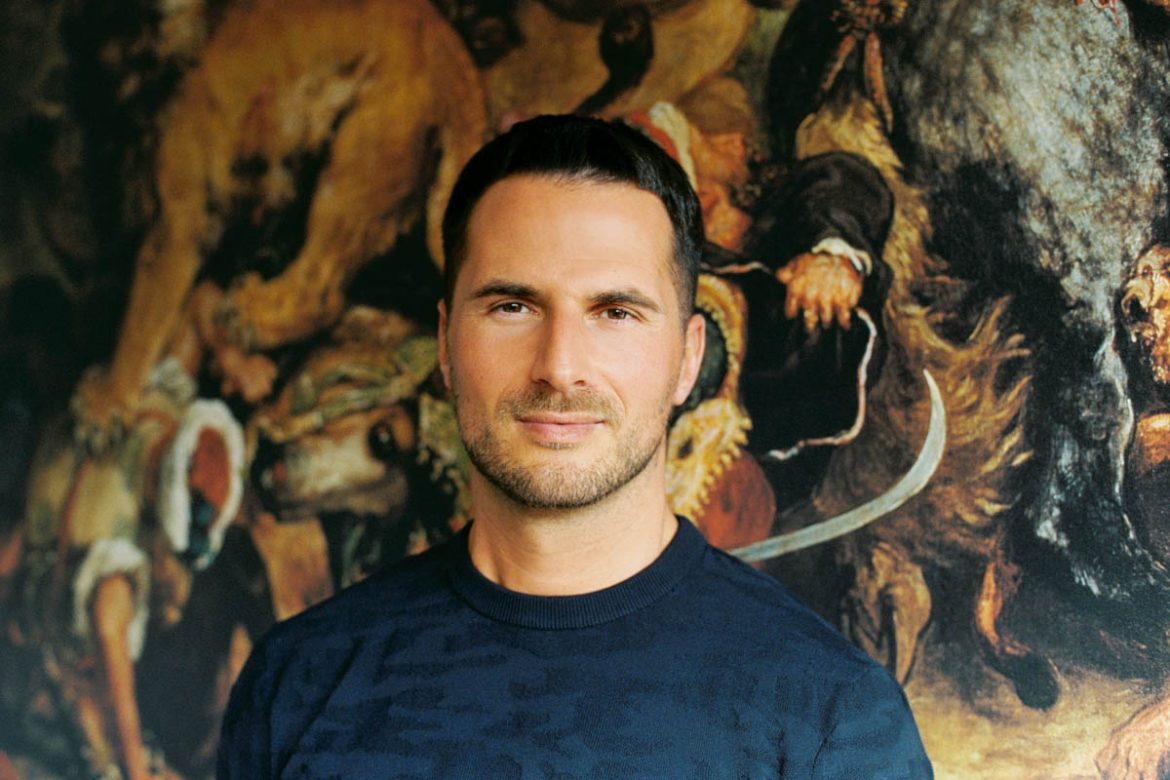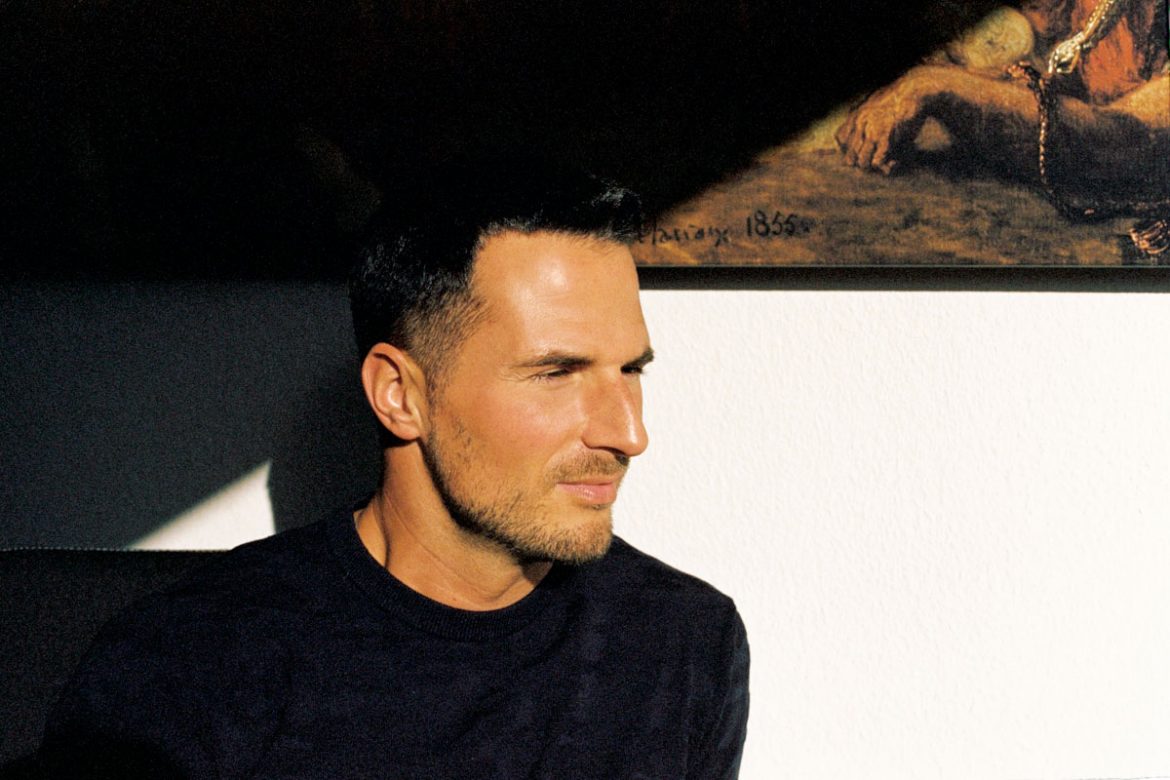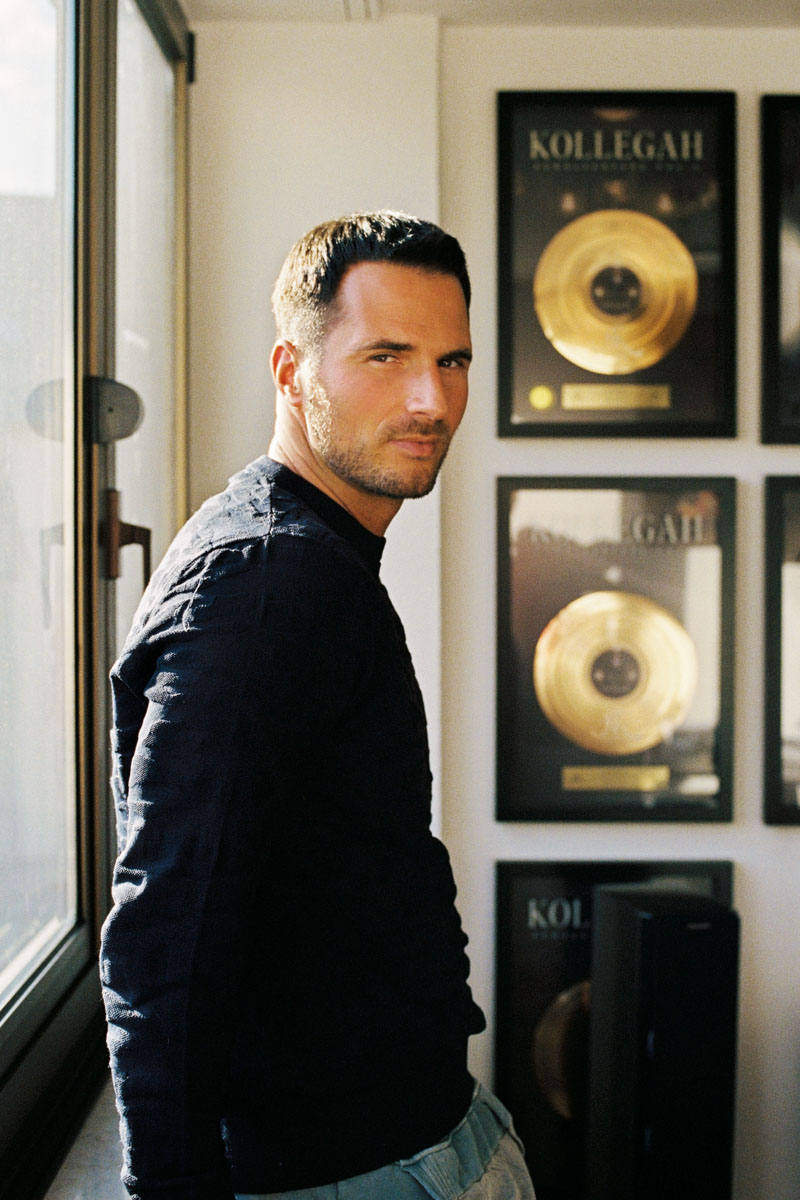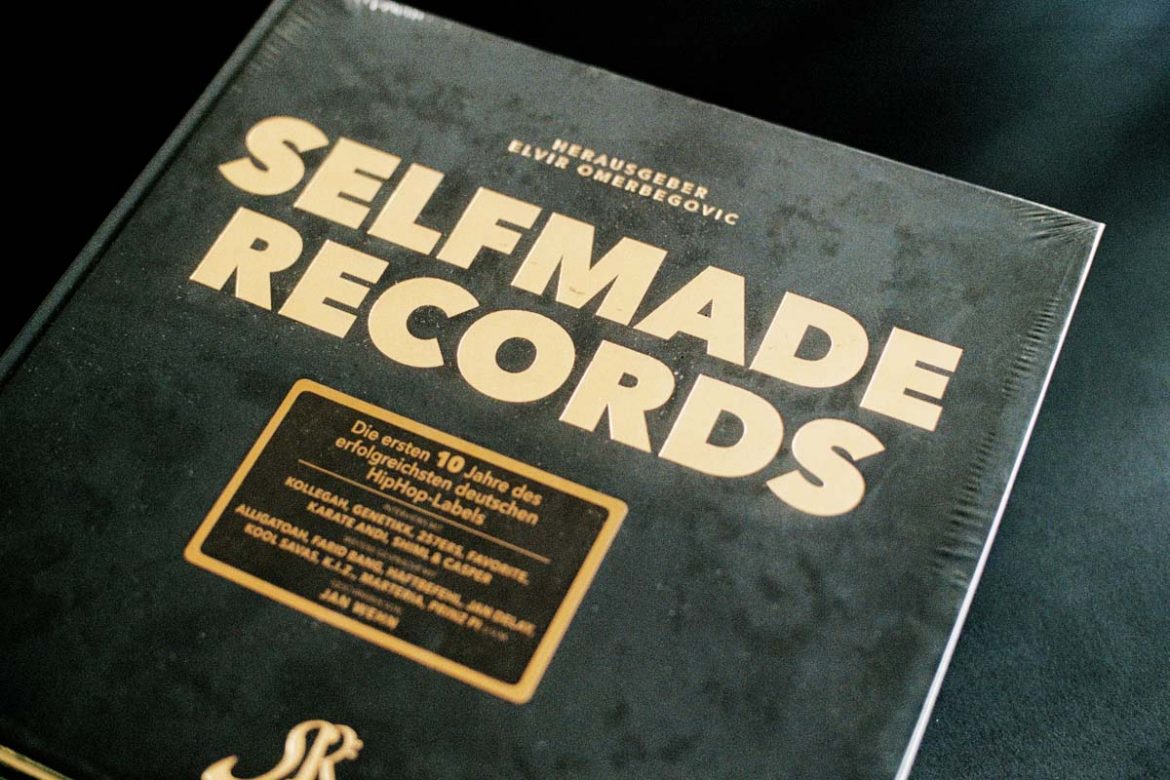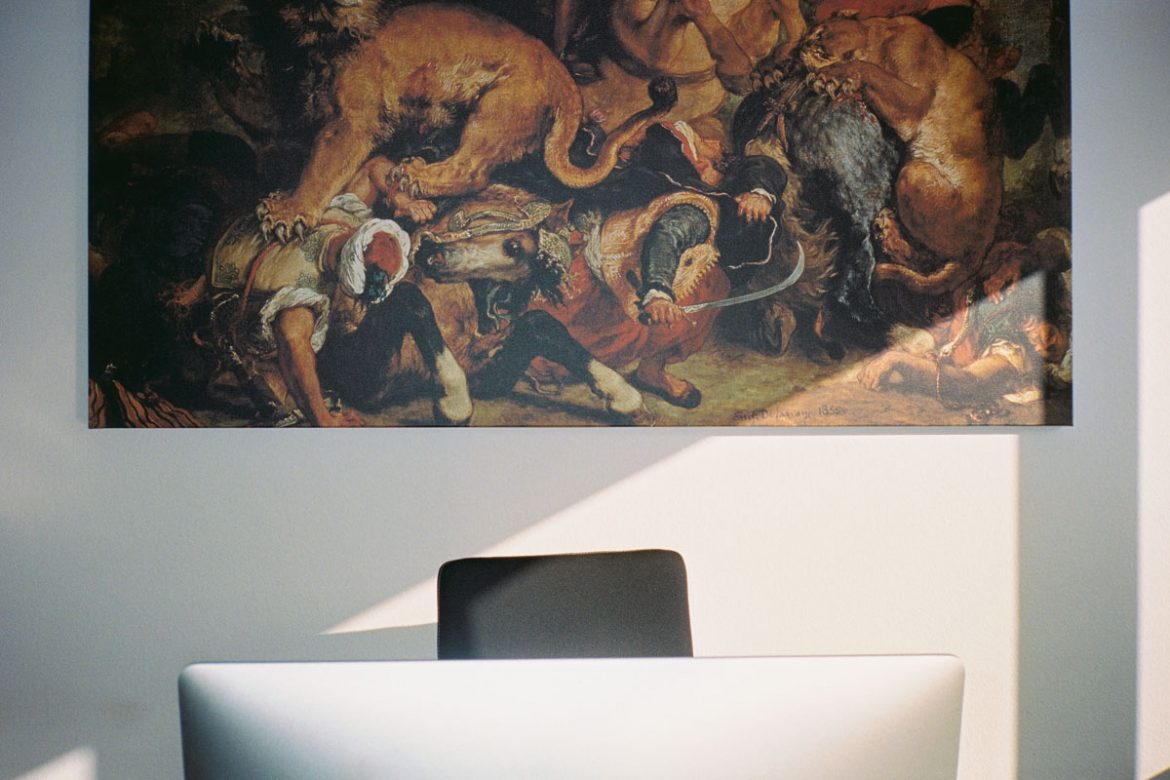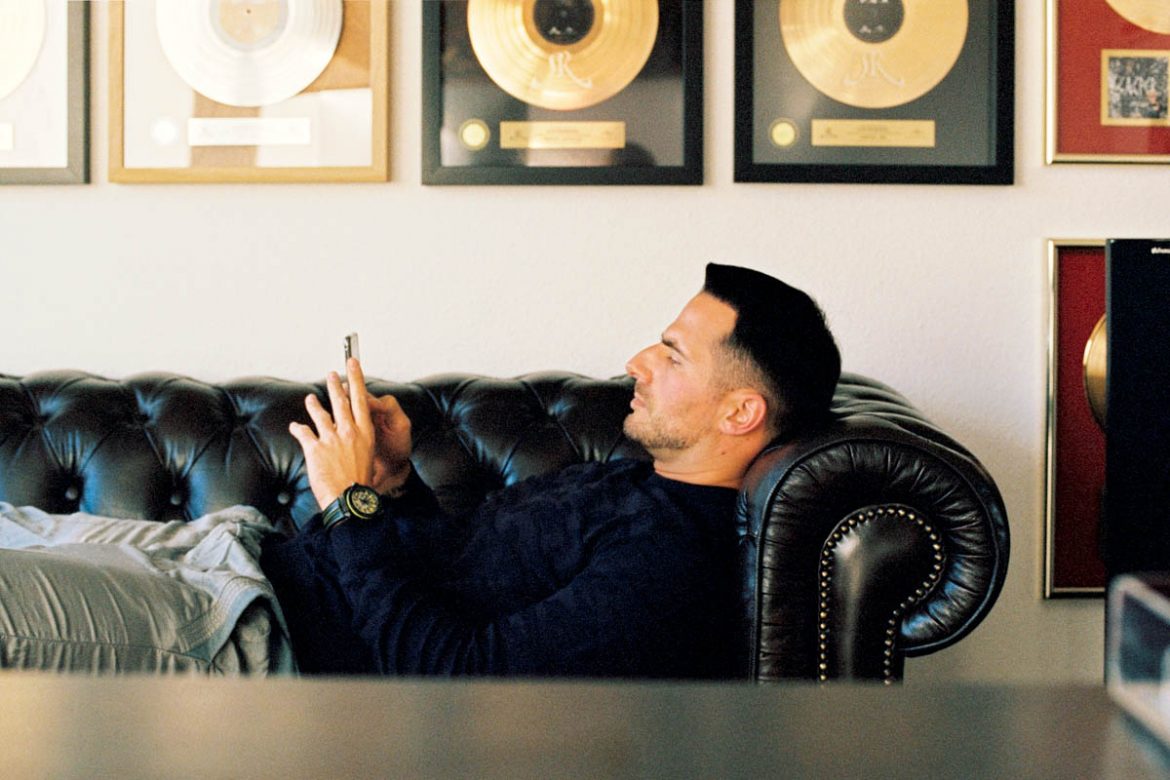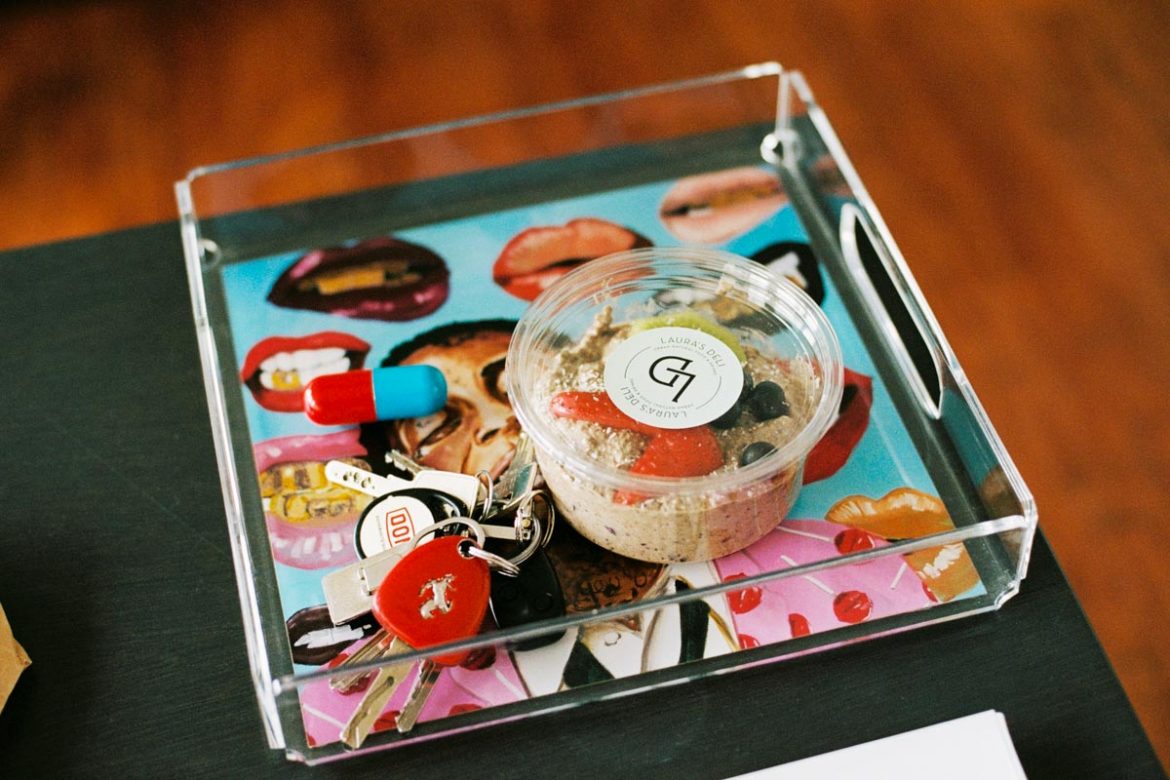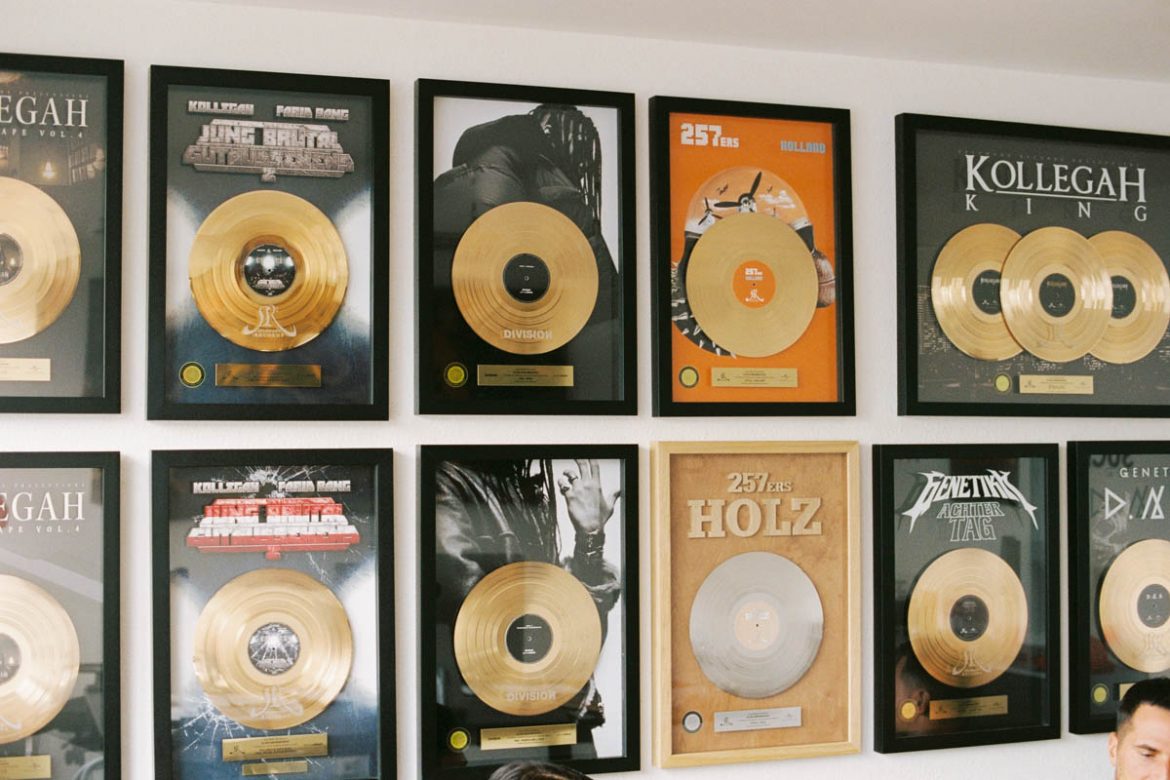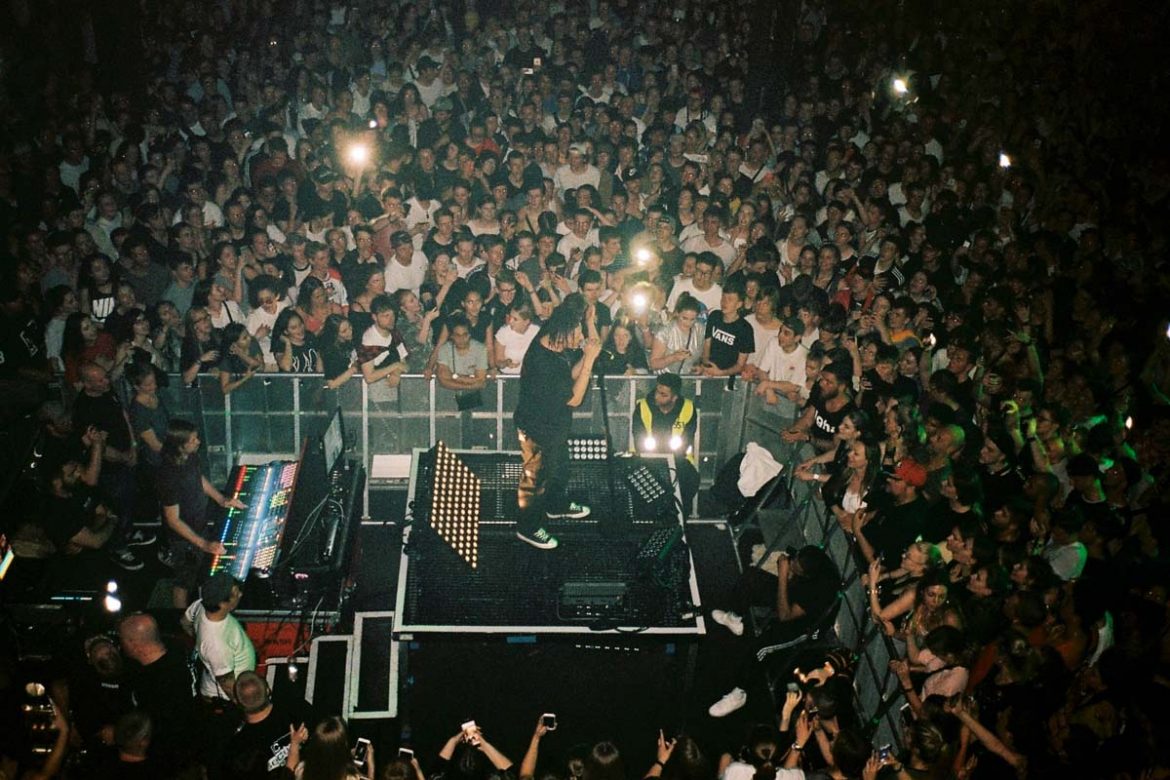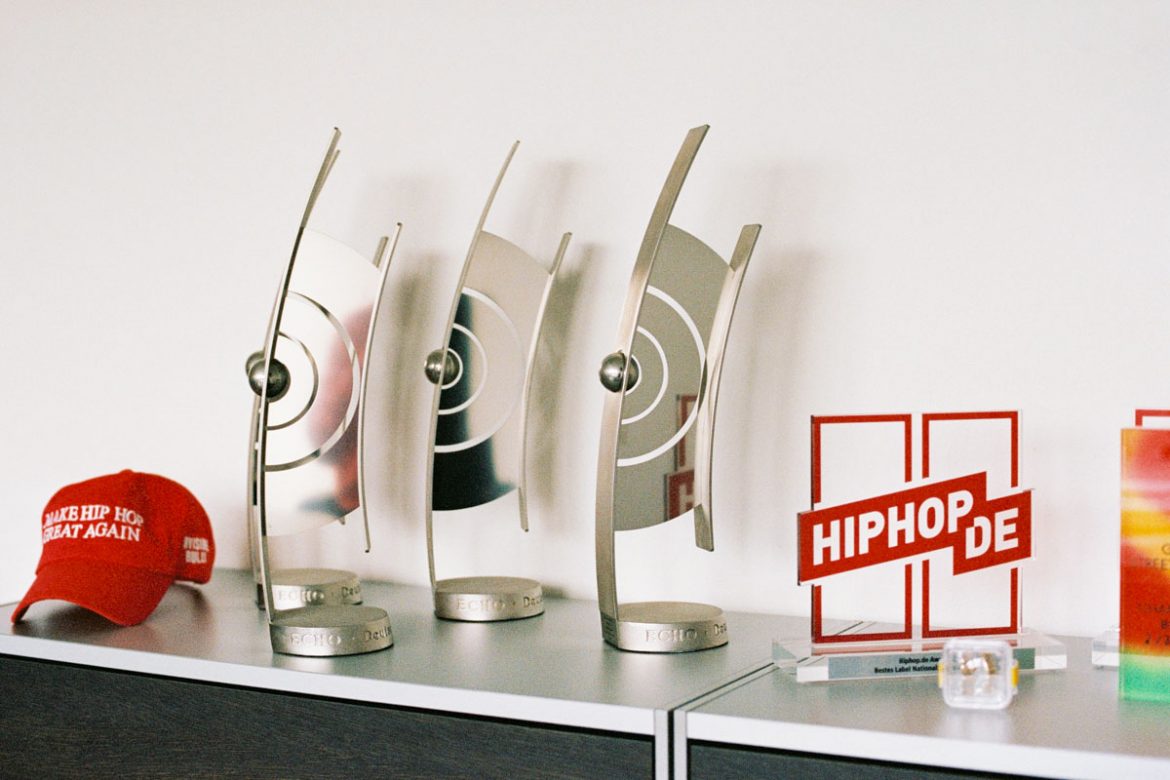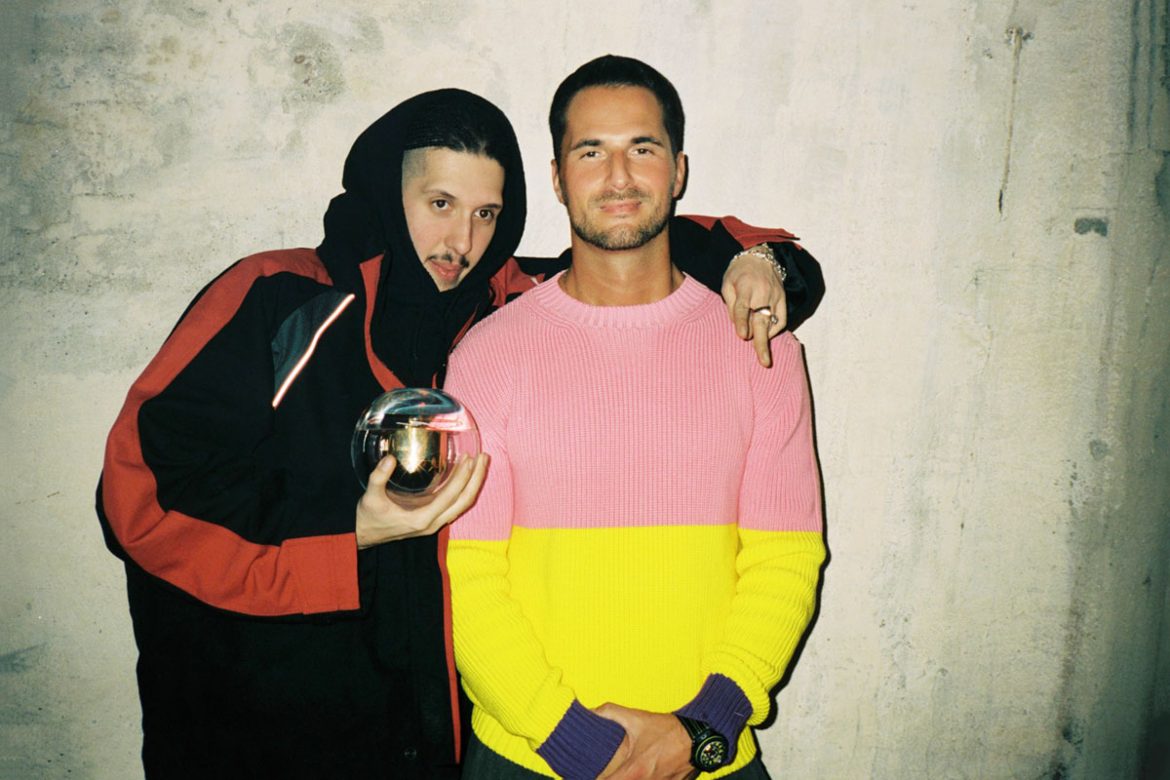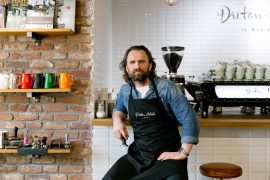Er führt das erfolgreichste deutsche Hiphop-Label der letzten 10 Jahre „Selfmade Records“, bei dem Rapper wie Kollegah, Genetikk, Casper oder die 257ers unter Vertrag sind oder waren. Mit dem neuen Label „Division“ ist er für den Erfolg von RIN verantwortlich, der für eine neue Generation deutschsprachiger Hiphopper steht. Er trägt den Titel ‚President of Rap‘ bei Universal Music Germany, betreibt das Modelabel „Pusher Apparel“ & ist Mitgründer des Eis mit Alkohol “SUCKIT” – privat sammelt er Sneaker und Jogginghosen. Was treibt einen wie Elvir Omerbegovic an? THE DORF traf den 37-jährigen in seinem Büro in Düsseldorf, um es herauszufinden.
>> Please scroll down for English version <<
THE DORF: Du bist in einem „sozialen Brennpunkt“ in Mettmann aufgewachsen, kann man das so sagen? ELVIR OMERBEGOVIC: Ich bin in einem Sozialbau in Mettmann aufgewachsen. In Mettmann gab es drei in Anführungsstrichen „Ghettos“ – also: alles Sozialwohnungen, hoher Ausländeranteil, hohe Arbeitslosigkeit – die üblichen Faktoren.
Würdest du sagen, dass Dich das geprägt hat, und wenn ja wie? Das ist nachträglich nicht so leicht zu sagen, man hat nur die eine, subjektive wahrgenommene, Kindheit. Es gab recht viel Gewalt. Ich kenne einige, die dort mit mir aufgewachsen sind, die wegen teils schwerer Straftaten ins Gefängnis gingen. Ich habe Messerstechereien miterlebt und Familiendramen, die Wohnung unter uns wurde beispielsweise einmal angezündet. Ich bin dann im ‚reichen‘ Stadtteil aufs Gymnasium gegangen. Da habe ich dann gemerkt: Das geht auch alles viel stressfreier und positiver. Das war schön zu sehen und hat mir neue Möglichkeiten aufgezeigt. Wenn die Eltern den Job verloren haben, hatte man als Kind auch mal Existenzangst. Das hat dazu beigetragen, dass ich gesagt habe: Wenn ich die Möglichkeit habe, arbeite ich hart genug, um das für mich auszuschließen. Ich habe auch früh mit Sport angefangen – das war ein guter Ausweg, auch um sich von den Problemen der Straße fernzuhalten.
Wie bist du zum Hiphop gekommen? Ich habe, glaube ich, mit 13 oder 14 angefangen, Hiphop zu hören. Vorher habe ich eher Metal & Punk gehört, Slayer oder die Ramones, auch durch die ältere Schwester beeinflusst. Dann kam eine Guns’n’Roses-Phase. Rock. Metallica, aber auch härteres Zeug. Und dann kam Rap. „Enter the Wu Tang (36 Chambers)“ war neben Notorious BIGs “Ready to Die”eine der Platten, die den stärksten Einfluss auf mich hatten. Auch N.W.A. und andere Westcoast-Künstler liefen viel bei mir. Der Wu Tang Clan war aber die erste Rap-Crew, von der ich wirklich Fan war. 2013 haben wir lustigerweise zwei Songs mit den Clan-Mitgliedern aufgenommen, mit RZA & Method Man. Die waren dann auch fast alle bei uns im Studio und Büro und wir sind abends dann irgendwie im Rudas gelandet. Mit GZA hatte ich dann auch noch länger Kontakt, weil wir uns gut verstanden haben. Das war schon funny, auch wenn sie zu diesem Zeitpunkt nur noch Kultfiguren waren und sind.
Was war die erste Platte, die Du Dir gekauft hast? Ich denke, das war Guns’n’Roses ‚Appetite for Destruction‘ oder irgendwas von den Ramones. Ansonsten habe ich eher Songs von Yo MTV Raps auf VHS mitgeschnitten und auf Tapes recordet. Ich hatte kein Geld, mir ständig Platten zu kaufen. Es gab damals viel gute Musik, auch weil es schwerer war, einen Plattendeal zu bekommen. Heute hat jeder die Möglichkeit, Musik öffentlich zu machen, da gibts auch qualitativ gesehen echt viel Schrott. Da versuche ich mich rauszuhalten, auch wenn sich Geld damit verdienen lässt.
Und wie kamst Du zum deutschen Hiphop? Das war deutlich später. Deutscher Hiphop hat mich nie interessiert, weil ich ja eher Hardcore-Sachen gehört habe. Ich hatte bis dahin in Sachen deutschem Hiphop immer nur Fünf Sterne Deluxe und das Bo im Fernsehen gesehen und das war mir einfach zu flach. Ich fand das langweilig – im Vergleich zum US-Rap. Dann habe ich Creutzfeld & Jakob persönlich kennengelernt und fand die Musik erstaunlich gut. Das war ein Aha-Moment für mich, wo ich gedacht habe: Man kann also auch auf Deutsch guten Hiphop oder Rap Machen. Von da an war ich mit den Jungs öfter unterwegs. Das war ein bisschen das Pendant zu dem East-Coast-Hiphop, den ich mochte. Über die beiden habe ich Bushido kennengelernt, der mit Philipp dann mal bei mir zuhause war. Das war noch vor der Labelgründung, also etwa 2003. Er hatte gerade „Vom Bordstein bis zu Skyline“ bei Aggro Berlin veröffentlicht. Die Platte war sehr gut und auch visuell krass umgesetzt.
Worauf achtest du bei deutschem Hiphop mehr: Auf Texte und Flow oder auf Beats und Produktion? Kannst Du sagen, was aus Deiner Sicht der wichtigere Part ist? Das wandelt sich gerade. Meine Acts unterscheiden sich in diesen Aspekten sehr stark. Früher war es mir bei meinen Signings viel wichtiger, dass Künstler technisch krass reimen können. Also wie bei Kollegah, mit Doppeldeutigkeiten und Co. – echte Reimkunst. Bei Favorite war das genauso. Damals habe ich technischen Rap forciert. Dabei war das in der ‚Berliner Phase‘ noch gar nicht so wichtig, das war alles ein bisschen atziger. Da ging es eher um lustige oder schockierende Inhalte. Wir sind lyrisch Ferrari gefahren, würde ich sagen. Das hat die Szene maßgeblich geprägt und die neuen Künstler haben sich dann daran orientiert und es ist alles technischer geworden. Jetzt habe ich Spaß daran, dass wir nicht mehr auf jedes Wort achten, sondern eine neue Art der Projektionsfläche bieten. Ich finde es gut, dass sich die Szene wieder auf Atmosphäre und Musik konzentriert. Es wurde mir persönlich nach 13 Jahren ein bisschen langweilig, immer technischen Rap zu hören. Ich finde es schön, dass den Jugendlichen, der neuen Generation, gezeigt wird, es ist okay, Gefühle zu zeigen. Es ist okay, traurig zu sein. Es ist okay, sogar schön, verliebt zu sein. Diese emotionale Komponente hatten wir lange abgestellt. Bei RIN haben wir 50 Prozent Frauenanteil in der Hörerschaft, das ist mehr als das doppelte von dem, was wir früher hatten. Es macht Spaß, diese rohen Emotionen zu hören. Es hat aber beides seine Daseinsberechtigung.
Bei RIN ist es derzeit ähnlich wie es bei Kollegah, Casper oder auch den 257ers anfangs war, es ist neuartig und in Deutschland sind die Hörer nicht sofort super offen, oder?Es muss nicht jeder unsere Musik feiern. Was wir machen, muss nicht jeder mögen. Wir müssen nicht jeden glücklich machen. Im Gegenteil. Wir machen uns glücklich. Ich habe keine Lust auf “den größten gemeinsamen Nenner” in meinem Leben. Wer das nicht geil findet, der muss es nicht konsumieren. Wenn man jeden glücklich macht, dann ist man bei Helene Fischer. Meine Mutter hört Helene Fischer. Ich war mit meiner Mutter beim Helene Fischer-Konzert. Das war echt hart für mich, das durchzusitzen. Wir hatten, supernett vom Veranstalter, eine eigene Suite. Meine Mutter fand das natürlich scheiße, weil sie nicht so nah an der Bühne war. (lacht) Ich hab also auf dem VIP-Parkplatz da geparkt und dann dachten die Fans wohl irgendwie ich sei Florian Silbereisen. (lacht) Das war der Horror. Aber hey, die Show – rein performancetechnisch ist die super. Die Musik kann ich mir natürlich keine drei Minuten anhören. Egal, Mama war happy!
Wie viele Leute seid ihr bei Selfmade Records? Das Kernteam sind vier Leute. Und dann kommen noch Mitarbeiter von Universal Music in Berlin hinzu, zum Beispiel im Vertrieb oder anderen Bereichen. Bei jedem Projekt sind aber in der Regel immer über 20 Leute beteiligt. Aber wir machen mit den Acts gemeinsam die Platten und treffen alle wichtigen Entscheidungen autark.
Division ist ein neues Label, auf dem Du auch RIN veröffentlichst. Warum hast Du das gegründet? Das liegt daran, dass es gerade so etwas wie einen Generationswechsel im Hiphop-Business gibt. Selfmade Records hat eine eigene Fanbase, ähnlich wie Def Jam in den USA. Selfmade Records ist eine eigene Marke. Ich wollte vermeiden, dass RIN direkt ein Stempel aufgedrückt wird und eine neue Grünfläche schaffen.
Was ist genau dein Job bei Universal als ‚President of Rap’?Universal und Ich haben ein JointVenture. Außerdem bin ich Consultant und werde zu größeren Deals, mit Acts abseits von Universal, nach meiner Meinung gefragt.
Kommt man sich da auch mal in die Quere? Da gilt das Recht des Schnelleren. (lacht) Aber meistens ist es ja so, dass ich Acts viel früher aufgreife. Kollegah hatte damals noch keine Platte veröffentlicht, Casper hatte, glaube ich, ein Mixtape draußen und RIN hatte ebenfalls noch kein Album veröffentlicht.
Wie kommst du denn an die Leute? Stecken dir Freunde Tapes zu, oder bekommt Ihr Einsendungen? Ganz unterschiedlich. Man hat irgendwann den Vorteil, dass die Historie für einen spricht und junge Talente deine Arbeit der vergangenen Jahre kennen und selbst Fan waren.
Woran erkennst du denn Talente?Das ist schwer zu beantworten. Es gibt keinen Fragenkatalog, den ich abarbeite. Es ist ein Gespür. Für mich ist wichtig, dass es beim ersten Hören irgendwie funkt. Man muss sich das so vorstellen, wie wenn man sich verliebt. Man trifft ja theoretisch viele potenzielle Partner. Dann gibt es ganz viele rationale Gründe, warum der Partner toll ist. Aber das Liebesgefühl kommt oder kommt eben nicht. So in etwa signe ich Acts. Mit dem Vorteil, dass ich auch selber an der Karriere mitarbeiten kann. Normale A&Rs (Anm. d. Red: Artists & Repertoire, der redaktionelle Teil eines Plattenlabels) bei einem großen Plattenlabel können das eher selten.
Was ist denn mal mit weiblichen Talents? Ich würde sehr gerne mit einer weiblichen Künstlerin zusammenarbeiten. Ich habe aber bis jetzt noch keine Rapperin gehört, die mich flasht. Die muss mich genauso abholen wie ein männlicher Künstler. Dann würde ich das sofort machen. Wobei wir mittlerweile auch Crossover-Acts arbeiten könnten, also nicht nur straighten Rap.
Bist du schon einmal mit einem Künstler auf die Schnauze gefallen? Nein. Klar, es gibt Unterschiede in den Verkaufszahlen. Wir sind ein Label, das eine außergewöhnlich hohe Trefferquote hat. So viele Gold- und Platinkünstler, wie wir hervorgebracht haben, hat noch kein anderes deutsches Hiphop-Label hervorgebracht. Das ist, glaube ich, dem Umstand geschuldet, dass ich gar kein Geld hatte, um mir Fehltritte zu leisten. Bei uns war das so: Das musste funktionieren, damit wir die nächste Platte finanzieren konnten. Das ging auch ein paar Jahre immer so: Von Platte zu Platte.
Was hörst Du privat? Ich höre tatsächlich Querbeet. A good Song is a good Song. Ich höre sehr wenig elektronische Musik. Ich kann mit House wenig anfangen, da ist mir oft zu seelenlos und ich nehme keine Drogen. Die Stimmungs-Spotify-Playlist ‚Calm Vibes‘ höre ich wahrscheinlich anteilig am meisten, beim Arbeiten. Ich geh auch gern in die Oper. Mein letzten privat besuchten Konzerte waren Metallica & Drake.
Welches Buch liegt aktuell auf dem Nachttisch? Eine kurze Geschichte der Menschheit von Yuval Noah Harari.
Wie würdest Du Deinen persönlichen Stil beschreiben? Sportlich Urban. Ich trage meist Jogger & Sneakers. Eigentlich fast immer. Auch weil ich sehr viel Sport mache. Die Leute schauen einen schon etwas komisch an, ich wurde schon öfter gefragt ob ich Fußballer wäre (Ich weiß nicht, ob ich das als Kompliment werten soll). Aber ich habe keine Lust mich zu verbiegen, ich gehe so auch in Clubs oder zu Geschäftsmeetings.
SW: Als ich in New York war, war ich in einem fancy Sneakerstore, da gab es die teuersten Sneaker, die ich je gesehen habe. Das waren die aus ‚Zurück in die Zukunft‘, die selbstschnürenden, die kosteten 15.000 Dollar! Ja, du meinst ‚Flight Club‘ am Union Square oder Stadium Goods in Soho. Das sind Reseller-Stores. Ich hab Schuhgröße 13 – das ist eine deutsche 48. Wenn man bestimmte Schuhe sucht, ist das schon eine Herausforderung. Ich habe mir kürzlich die Adidas Futurecraft 4D Runner für 2.000 Euro gekauft, davon gibt es derzeit nur neun Paar auf der Welt als Sample. Also, die werden irgendwann erschwinglicher werden, wenn Sie auf den Markt kommen. Aber bisher steht noch nicht fest, wann das passiert.
Aber ziehst du die dann auch an? Klar zieh ich die an. Alles, was ich kaufe, benutze ich auch. Ich konserviere nichts. Was hab ich davon, das aufzuheben? Ich will sie allerdings auch nicht weiterverkaufen.
Wie viele Paar Sneaker hast Du zuhause und was ist Dein Lieblingssneaker? Ich habe über hundert Paar zuhause. Die meisten sind Adidas Ultraboost 1.0. Die hatten die besten Kollabos und Designs, viele sind jetzt im Nachhinein super selten. Davon gibt es dann weltweit 700 Stück und in meiner Schuhgröße wahrscheinlich nur 200. Das ist schon nerdy, weil das auf der Straße so gut wie niemand checkt und man es am Ende nur für sich macht. Aber es ist definitiv Culture. Adidas disruptiert den Sneakermarkt gerade durch technische Innovationen. Ich ärgere mich ein bisschen, eigentlich hätte ich mit dem Wissen in die Adidas-Aktie investieren sollen. Die hat letztes Jahr einen 30-prozentigen Sprung gemacht. Da war ich ein bisschen betriebsblind und hatte nur die Fan-Perspektive.
Aktuell läuft auf deiner Playlist/deinem Plattenspieler? Seit zwei Tagen läuft Sheck Wes rauf & runter.
Danke!
Interview: Tina Husemann
Text: Barbara Russ
Photography: Sabrina Weniger
© THE DORF 2018
English version:
He runs ‘Selfmade Records’, the most successful German hip hop label of the last ten years where rappers like Kollegah, Genetikk, Casper or the 257ers are or were under contract. With his new label ‘Division’, he is responsible for RIN who represents a new generation of German hip hop artists. He is also the ‘President of Rap’ at Universal Music Germany, his fashion label ‘Pusher Apparel’ is selling like hotcakes and he has a private collection of sneakers and sweatpants. What drives somebody like Elvir Omerbegovic? THE DORF met the 37 year old at his office in Düsseldorf.
“It is important to me that somehow something clicks when listening to an artist the first time. It is almost like falling in love.”
THE DORF You grew up in a socially disadvantaged area in Mettmann, is it ok to describe it like this? ELVIR OMERBEGOVIC grew up on a council estate in Mettmann. In Mettmann, there were three so called ‘ghettos’ — that means: all social housing, high percentage of foreigners, high unemployment — the usual factors.
TD Would you say that it had an impact on you, if so, how? Retrospectively, that isn’t so easy to say. There is only the one, subjectively perceived childhood. There was quite a lot of violence. I know a few people who grew up with me, some of whom went to prison for serious crimes. I witnessed stabbings and family tragedies, the flat beneath ours was once set on fire, for example. Later I went to grammar school in a ‘rich’ neighbourhood. There I realised that a different life is possible, less stressful and more positive. It was nice to see and offered new perspectives to me. It can make a child very anxious when parents lose their job. This contributed to me thinking: If I get the opportunity, I’ll work hard enough to make sure it doesn’t happen to me. I also got into sports early on — it was a good way to stay away from the troubles on the streets.
TD How did you get into hip hop? I think I started listening to hip hop when I was 13 or 14 years old. Before that, I listened more to metal and punk, Slayer or the Ramones, also due to the influence of my older sister. Then came a Guns n’ Roses phase. Rock. Metallica, also harder stuff. And then came rap. ‘Enter the Wu Tang (36 Chambers)’ was next to Notorious BIGs ‘Ready to Die’ one of the records that had the greatest impact on me. Also, I listened to N.W.A and other Westcoast-artists a lot. However, the Wu Tang Clan was the first rap crew of which I was truly a fan. Funnily, in 2013 we recorded two songs with the clan members, with RZA and Method Man. They were almost all in our studio and office. In the evening, we somehow ended up at the Rudas club. I stayed in touch with GZA for a while because we got on really well. It was quite funny, even if by then they were (and still are) mainly cult figures.
TD What was the first record you bought? I think it was Guns n’ Roses ‘Appetite for Destruction’ or something from the Ramones. Other than that, I was rather recording songs from Yo MTV Raps on VHS and then taped them. I didn’t have the money to buy records all the time. Back then, there was a lot of good music, also because it was more difficult to get a record deal. Today, everybody has the opportunity to publish music. Qualitatively speaking, there is a lot of rubbish out there. I try to stay away from that, even though there is a lot of money in it.
TD And when did you discover German hip hop? That was a lot later. German hip hop was never really my thing because I was listening to more hardcore stuff. Until then, in terms of German hip hop I had only seen Fünf Sterne Deluxe and Bo on TV and that was definitely too shallow for my taste. In comparison to US rap, this was simply boring. Then I met Creutzfeld & Jakob personally and was surprised how good their music was. That was a turning point for me, when I thought: It is possible to make good hip hop and rap in German. From then on, I accompanied them often. It was a bit the pendant to the East-Coast hip hop that I liked. I met Bushido via them who visited me at home with Philipp at some point. That was before we founded the label, so roughly in 2003. He had just published ‘Vom Bordstein bis zur Skyline’ at Aggro Berlin. The record was very good and the visuals were amazing.
TD What do you focus on more in German hip hop: on lyrics and flow or on beats and production? Could you determine what is more important for you? This is in a process of change at the moment. My acts vary hugely in that respect. In the past, it was a lot more important to me that an artist had an incredible ability to rhyme technically. Like Kollegah, with double meanings etc — real rhyme art. With Favorite it was the same. Then I pushed the technical rap. Even though in the ‘Berlin Phase’ it wasn’t all that important, it was all slightly more rough. It was more about funny or shocking content. Lyrically, I’d say, we were driving a Ferrari. This had a big influence on the scene and young emerging artists. As a result, it all became more technical. Nowadays, I enjoy not focusing on each word so much anymore but on offering a new kind of surface for projection. I like that the scene has more of a focus on atmosphere and music now. After 13 years, it did get a bit boring to always listen to technical rap. I think it is great that teenagers, the new generation, are shown it is ok to have emotions. It is ok to be sad. It is ok, even beautiful, to be in love. These emotional components were turned off for a long time. With RIN we have 50% of female listeners, that is more than double of what we had in the past. It is fun to listen to these raw emotions. But both have equal rights to exist.
TD With RIN it is now similar to how it was with Kollegah, Casper or 257ers at the beginning, it is new and in Germany listeners are not always ready for something different, right? Not everybody has to be excited by our music. They don’t have to like what we do. We don’t have to please everybody. On the contrary. We make ourselves happy. I am not keen on ‘let’s find the common ground’ in my life. If you don’t like it, you don’t have to consume it. If you try to make everybody happy, you end up with Helene Fischer. My mum listens to Helene Fischer. I was with my mum at the Helene Fischer concert. It was really tough for me to endure that. We had our own suite, courtesy by the organiser. My mum hated that of course because she wasn’t close to the stage (laughs). Well, I was parking at the VIP parking lot and some fans somehow thought I was Florian Silbereisen (laughs). That was horrible. But hey, purely on a technical level, the performance and show were great. I cannot listen to that music for more than 3 minutes though. Never mind, mum was happy!
TD How many people are working at Selfmade Records? The core team consists of four people. And then there is staff from Universal Music in Berlin, e. g. in distribution and other areas. Usually more than 20 people contribute to a project. But we make the records together with the artists and all the important decisions are made independently.
TD Division is a new label, with which you released RIN as well. Why did you found it? I did that because there currently is a generational shift happening in the hip hop business. Selfmade Records has its own fan base just like Def Jam in the States. Selfmade is its own brand. I wanted to avoid for RIN to be immediately associated with that and create a new playing field.
TD What exactly is your job at Universal as ‘President of Rap’? Universal and I have a joint venture. Aside from that, I am a consultant and my advice is sought for larger deals — with acts not related to Universal.
TD Don’t you get in each other’s way sometimes? In those cases, the faster one wins (laughs). However, it is often the case that I pick up the acts much earlier. For example, Kollegah didn’t have a record released yet, Casper had, I think, a mixtape out, and RIN also didn’t have an album released yet.
TD How do you come across those people? Do friends pass tapes on to you or is stuff send to you? That varies greatly. It is an advantage that our history speaks for itself. Young talents know our work of recent years and were fans themselves.
TD How do you recognise a talent? That is difficult to say. There isn’t a set of rules. It comes down to instinct. It is important to me that somehow something clicks when listening to an artist the first time. It is almost like falling in love. Theoretically, you meet many potential partner and there are a lot of rational reasons why a partner would be great. But you either feel it, or you don’t. This is more or less how I sign acts. With the added advantage of being able to work on their careers as well. Regular A & Rs (Artists & Repertoire, the editorial part of a record label, note from the editors) at large record labels aren’t usually able to do that.
TD What book is on your bedside table at the moment? SAPIENS: A BRIEF HISTORY OF HUMAN KIND BY YUVAL NOAH HARARI.
TD How about some female talent? I would really like to work with a female artist. However, so far I haven’t come across a female rapper that has had this particular effect on me. She would have to impress just like a male artist has to. Then I would be up for it for sure. Nowadays, we could also work with crossover acts not only straight rap.
No other German hip hop label has produced as many gold and platinum artists. This may be due to the fact that I didn’t have any money and simply couldn’t afford to fail.
TD Was any of your artists ever a flop? No. Sure, there are differences in record sales. We are a record label that has an unusually high success rate. No other German hip hop label has produced as many gold and platinum artists. This may be due to the fact that I didn’t have any money and simply couldn’t afford to fail. That’s how it was: It simply had to work so we could finance the next record. For a number of years, we operated that way, from record to record.
TD What do you listen to in your own time? I actually listen to everything. A good song is a good song. I listen to very little electronic music. I don’t really get house, it is too soulless for my taste and I don’t take drugs. When working, I probably listen mostly to the Spotify playlist ‘Calm Vibes’. I also like to go to the opera. Metallica and Drake were the last non-work related gigs I went to.
TD How would you describe your personal style? Casual urban. I mostly wear sweats and sneakers. Almost always. Also because I exercise a lot. People look at me funnily, a number of times I was asked whether I was a footballer (not sure whether I should take that as a compliment). I don’t like to pretend, I go like this to clubs and to business meetings.
SW When I was in New York, I was at a fancy sneaker store, they had the most expensive sneakers I had ever seen. They were these from’ Back to the Future’, the self-tying ones, they cost 15 000 Dollar! Yes, you mean ‘Flight Club’ at Union Square or Stadium Goods in Soho. These are reseller stores. My shoe size is 13- that is a German 48. When you are looking for something particular, that can be a challenge. I recently bought the Adidas Futurecraft 4D Runner for 2000 Euro. Currently, there are only 9 sample pairs in the world. Well, they will probably become cheaper whenever they are on the market. But so far it is not clear when that will happen.
TD How many sneakers do you have at home and what is your favourite one? I own more than 100 pairs. Most of them are Adidas Ultraboost 1.0. They have the best collaborations and design, many are by now super rare. Worldwide, there are 700 pairs and in my size probably only 200. It is nerdy, because nobody on the street would get it and in the end, it’s only for yourself. However, it is definitely culture. Adidas disrupts the sneaker market with its technical innovations in particular. I am slightly frustrated because with this knowledge, I should have invested in the Adidas stock. It increased by 30 % last year. I only had the perspective of a fan and didn’t see beyond that.
TD What is currently on your playlist / your record player? For the last two days, i’ve kept listening to Sheck Wes again & again.
Thank you!
THE DORF • THE MAG is part of the #urbanana project by Tourismus NRW





